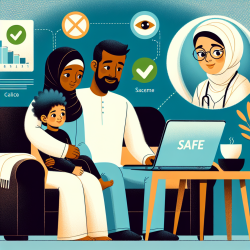As a practitioner dedicated to improving outcomes for children with autism, it's essential to stay informed about the latest research and interventions. The recent study, "SAFE, a new therapeutic intervention for families of children with autism: study protocol for a feasibility randomised controlled trial," published in BMJ Open, presents promising insights into a family-centered therapeutic approach known as Systemic Autism-related Family Enabling (SAFE).
SAFE therapy aims to address the multifaceted challenges faced by families of children with autism, including mental health issues, stress, and behavioral difficulties. The study's primary goal was to assess the feasibility of conducting a fully powered randomized controlled trial to evaluate the efficacy of SAFE therapy.
Key Findings and Implications for Practice
The study involved families of children aged 3-16 years, who were randomized to either receive SAFE therapy in addition to usual support or continue with usual support alone. The researchers collected data on various outcomes, including family functioning, child behavior, and mental health.
Feasibility and Acceptability
- The study demonstrated that it is feasible to recruit, randomize, and retain families in a trial setting.
- Both therapists and families found the SAFE intervention acceptable, highlighting its potential for broader implementation.
Clinical Outcomes
- Preliminary data indicated improvements in family functioning, child-parent attachment, and reductions in anxiety and depression among participants receiving SAFE therapy.
- These findings suggest that SAFE therapy could be an effective intervention for addressing the complex needs of families with children with autism.
Practical Steps for Practitioners
To integrate the insights from this study into your practice, consider the following steps:
- Educate Yourself: Familiarize yourself with the SAFE therapy protocol and its underlying principles. Understanding the systemic approach and the specific activities used in SAFE can enhance your therapeutic toolkit.
- Collaborate with Families: Engage families as active participants in the therapeutic process. SAFE therapy emphasizes collaboration between therapists and families, which can foster a more supportive and effective intervention environment.
- Monitor and Evaluate: Implement outcome measures similar to those used in the study, such as the Systemic CORE 15, to monitor progress and make data-driven decisions about the effectiveness of the intervention.
- Advocate for Comprehensive Care: Advocate for integrated, family-centered care within your practice or organization. Highlight the importance of addressing the mental health and well-being of both children and their family members.
Encouraging Further Research
While the feasibility study provides valuable insights, further research is needed to establish the efficacy of SAFE therapy on a larger scale. As practitioners, you can contribute to this effort by:
- Participating in Research: Consider participating in or supporting future randomized controlled trials to gather more robust evidence on the effectiveness of SAFE therapy.
- Sharing Findings: Share your experiences and outcomes with colleagues and the broader professional community to promote evidence-based practices.
By staying informed and actively engaging in research and evidence-based practices, we can continue to improve the quality of care and outcomes for children with autism and their families.
To read the original research paper, please follow this link: SAFE, a new therapeutic intervention for families of children with autism: study protocol for a feasibility randomised controlled trial.










